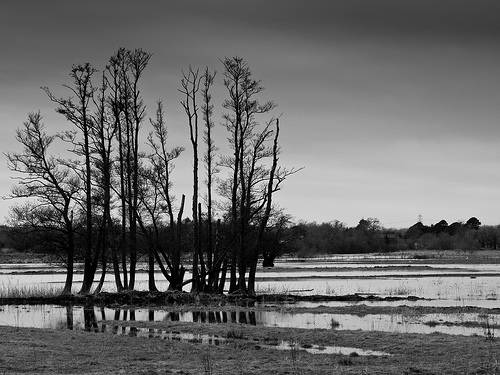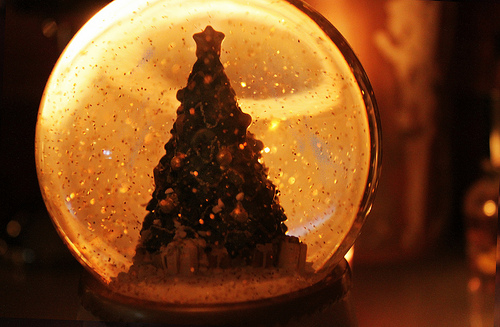If I had noticed them, standing there, standing by, I would have felt sorry for them. But I only had eyes for my girl. I should have felt sorry because, being my family, they couldn't run away. They couldn't pull that conjuring trick of disappearing for six months, a year. Then coming back with a forced smile and pretending that none of this had ever happened. That there was no other baby. Vanishing her with a slick sleight of hand. A grandchild, a niece. Here and then gone in a puff of smoke.
When I did finally look up, they were still standing there. Three decades of looking to them for succor, for consolation, for aid and I felt as though I had taken a hammer to them, smashed their bones, set a snare or a pit fall trap. "Come with me," I'd whispered in their ears. Luring them towards a place where they could only be hurt. Coaxing them along with me to a place of death and illness with false promises of chubby babies and matching outfits.
Until the day Georgina died I hadn't hit my younger sister for at least two decades. Our days of tussling and hair pulling long behind us. But that day, I felt as though I had delivered a sucker punch to that face, so dear to me. When I handed her the dead body of her niece with such maternal pride, I ripped at her flesh, pinched and pulled and bruised. In one fell swoop, I took all her security, all her potential pleasure and joy in her own pregnancies and babies, all her calm, all her peace and crumpled them up. I only hope that she has managed to smooth them out again and, whilst they will never be as they were, that they are still usable, that they will serve. And I am so sorry, more sorry than I can say. I was supposed to protect her, to show her that this was easy and lovely.
But she didn't run, she didn't fall silent, she didn't refuse that body, its smallness, its deadness. She didn't flinch or look disgusted. And, if it were possible, that made me even sadder that my daughter had lost her own sister. And she'll likely never have another.
*****
I sometimes feel that I was the bystander, the observer. As I watched my daughter's twin sister die. Because it is not in my generation that her absence will echo longest. After all, I managed to live nearly thirty years without her. I expected her to carry on living, long after I had died. But her siblings, they could have had a relationship with Georgina that lasted throughout the entire course of their lives, it could have been their longest connection, their most lengthy friendship. And nobody might have known Jessica better than her twin, kindled into being alongside one another, nervous systems and heart forming together. Georgina could have been a confidant, a supporter, a source of worry or trouble, a mortal enemy? I'll never know and Jessica will never know either. With luck I expected to fade out of Georgina's life at the half way point. But Jessica, she lost the potential of a lifelong companion. And sometimes that seems so much worse, so far greater a loss, than my own.
*****
I have always been easily hurt. When I was a child, my father tried to toughen me up. It didn't work. I am, I have concluded, un-toughen-up-able. I am still what the kind would call sensitive and the unkind, a wuss. When Georgina died I felt as though all of my skin had been flayed off. That there was only the thinnest line of defence between the outside world and my churning, flinching internal organs. A couple of lines of cells perhaps. Not much of a shield.
And then those words come. Those words. You don't need me to spell them out because you've all heard them already. People have said them to you, about your baby or your babies, about your grief, about how this all makes sense only you can't see it, about how you are too angry or too sad, about how you need to be like this or like that, about your self pity or self-absorption.
Like needles, piercing my onion skin remnants as I tried to clutch them around me, stabbing straight into my guts. When these words come from a nobody, a passerby, the needle jabs in and comes straight out again, a clean strike. But when they come from somebody close, someone you love, the needle can go in and explode. Like a dirty bomb. Spinning out fragments that scratch and remain. Thin pieces of metal that can encourage infection or which linger, healed over but never entirely integrated. Irritating your flesh.
And I began to understand how family feuds begin, how people can chop those they once loved off like a diseased tree limb, never to be spoken of again, fit only for burning. Some of those words are not easy to forget. Sometimes I question whether, by forgiving them, I have somehow allowed my daughter to be set aside, considered less. Because I am afraid to make a fuss, to call them out, to say "no, you may not speak about her in that way. Do not dare."
 Photo by wwarby
Photo by wwarby
But then I remember. All those other words, the words that wrapped me and my little girls up so tightly. That told me that she mattered. The dead one. The tiny, broken one. That I mattered. That what had happened was sad but that it was not my fault. The hands that held me and washed me and smoothed my hair. That cooked my meals and filled my car up with petrol and made sure that the mortgage got paid. And those binding, wrapping words, those kindly hands, are so much more important to me.
It doesn't matter that the hurtful and the helpful often came from different individuals, some consistently jabbing at me with exploding needles, others always handing out tea and scones. Because it is easier to deal with being wounded with someone's arm slung around your neck. And, having lost one, I didn't want to lose anyone else, even those wielding pointy needles. Or perhaps I was just too much of a coward to risk making a scene.
But here's the thing about family, be they the family you call your own by blood or the family that chooses you and that you choose in return, when others run away, they might just stay. If you're lucky. When others are silent, they might continue talking. When I was walking around like an open sore. When there were no right words because the only words I wanted to hear were something along the lines of, "oh this has all been some major administrative error and obviously should never have occurred. Our apologies and please do reclaim your daughter. Just fill in this form." When they had to talk on a subject that was painful and uncomfortable to them for hours and hours because I would not countenance anything else? Well it's inevitable that somebody's feelings are going to get hurt. It's hard to talk about grief and death at length, especially with someone who is as easily jabbed as I am.
I found this quote on the internet a while ago, my sources tell me it's a Swedish proverb. These words remind me of my family.
'Love me when I least deserve it because that is when I really need it.'
+++++
And your family? Your friends? Did they run? Did they flinch? Did they say the right things? Or the wrong things? Or nothing at all?
If they hurt you, did you manage to resolve it? Did you cut any family members or close friends off entirely? And how do you feel about that now? Regretful, remorseful? Or glad and relieved?




